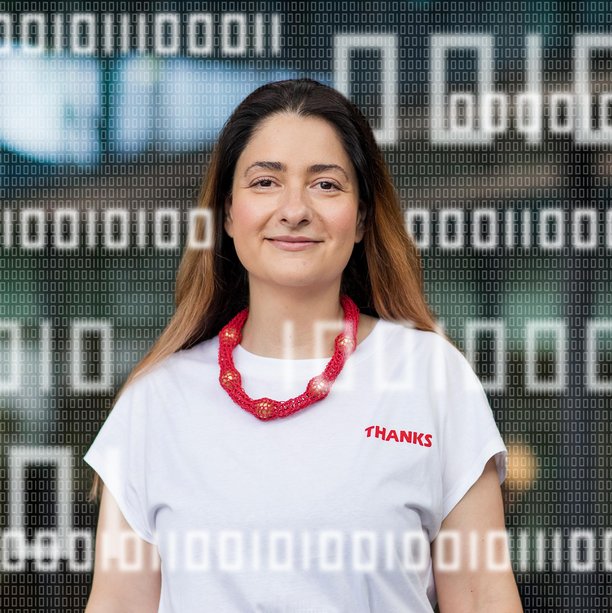Making complex decisions with the help of AI
Stella Kapodistria is assistant professor in the Department of Mathematics and Computer Science, where she is part of the Stochastics section. She is also involved in the work of EAISI, the new institute of TU/e in the field of Artificial Intelligence. Artificial Intelligence plays a crucial role in Stella's research. A short introduction in five questions and answers.
What is your key research question?
My main research question is how to make optimal decisions without human intervention based on a trove of data. I do this using mathematical models and smart algorithms stemming from stochastics, machine learning and artificial intelligence.
Consider for example an off-shore wind turbine or a network of systems such as an off-shore wind park. In the era of the internet of everything (IoE), such highly-valued systems are connected to the internet and are outfitted with digital sensors, that permit the real time collection of data capturing the status of the systems. Think of connectivity to the grid, power output measurements, weather conditions, vibration readings, pressure readings, temperature readings, etc.
This equips us with an almost perfect knowledge on the condition of the wind turbine without having to physically inspect it. Given this wealth of real-time information, we are able to answer to questions such as: How much energy should we store? When should we curtail the power output to ensure the stability of the network? When to physically inspect the system and when to perform minor maintenance activities? When to proactively perform major maintenance activities on crucial components so as to ensure 100 per cent availability of the system? Using data and smart algorithms, we are able to predict when a machine is about to fail and, based on that, we can decide what is the optimal moment to carry out major maintenance activities. All these sub-questions are examples of what motivate my research.
What is the key challenge in your work?
AI can discover, if given enough examples, its own rules. Think of the AlphaGo example, where the computer checked one million games and discovered what is a winning pattern. Unfortunately, as far as the above questions are concerned our available data do not include sufficient examples for the algorithm to discover these winning patterns. To overcome this hurdle, I design smart mathematical approaches that enable computers to determine the best course of action. This starts with the extraction of the relevant information from an abundance of data. Then this information is converted through a smart algorithm to knowledge that can be used for a first decision. Thereafter, these algorithms are constantly improved to account for new information and are regularly updated to account for changes in the design of the systems. The biggest challenge in using AI for decision-making is that after the decision is implemented in practice all new data are “corrupted" from the implementation of the decision and as such they will exhibit new patterns. For this reason, it is paramount that the algorithm is constantly updated to account for this effect, ensuring that the new versions of the algorithms do not suffer from bias.

What are the practical applications of your research? How does it benefit society?
In today’s society, we expect systems to be operating at all times. In today’s industry, we expect to have fully automated systems, that do not require constant human intervention. We are already designing smart systems that ideally report on their condition and, in the future, we envision that these systems will autonomously identify imminent failures, infer their causes and resolve the problem. My work in designing smart algorithms, sets the stepping stones in building such smart autonomous systems, by revealing the value of data for high-quality decisions, and ultimately by improving the everyday life of people.
How do you see the development of AI in the future?
Think of a world in which systems are smart enough to detect threats, to report them and together report the best course of remedy or even systems that autonomously resolve threats. For example, in the past, we needed on a regular basis to check the oils in a car, today a smart sensor notifies us when it is time to do so. This is a small example in which AI has helped improve our everyday lives. In the future, we expect not only cars to be fully autonomous, but also complex systems, wind parks that store extra produced energy and make this energy available at times of low energy supply, ensuring a constantly low price of energy at all times. Or wind turbines that curtail their power output to ensure not to overflow the network with energy at times of high wind speed.
Algorithms that can optimally decide on these actions and that can ensure the optimal autonomous operation of such complex systems, require excessive computation time. This is due to the so-called curse of dimensionality, which means that the amount of data needed to gain sound and reliable results increases exponentially with the number of available features, i.e., the data characteristics. So, we need to think in a smarter way and develop simple models that can be used for predictions and for decision-making in real time. Smart solutions that do not suffer from issues of computational complexity. Solutions that are interpretable and that we can use to constantly improve the design and operation of systems.
Why should any AI researcher want to work at the TU/e?
Nowadays problems are vastly more complex than anything we have tackled in the past. Such problems cannot be solved by simply applying methods which at an earlier stage might have been sufficient. If we want to solve them, we must revolutionize our thinking, revolutionize our methods and become beacons of knowledge to the younger generations. TU/e has a long tradition in novel, multi-disciplinary research together with the industry and in out-of-the-box education in our programmes. These are exactly the ingredients needed to solve the complex problems of the future and, for AI, to achieve its true envisioned potential. Plus, it is important to mention that TU/e offers a diverse, multi-cultural research environment in which personal contribution can excel and team work can thrive.
Help us prevent system failures
Are you interested in the work of EAISI? Want to join Stella in her work on predictive algorithms? Either as a student or an academic? Check out what TU Eindhoven has to offer.
